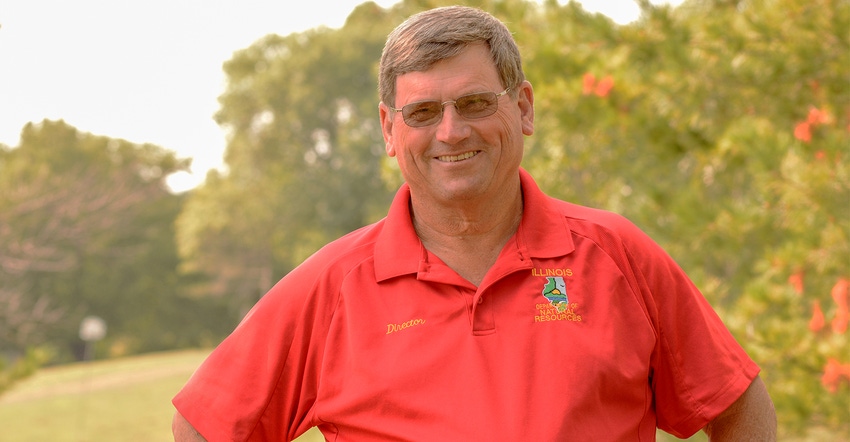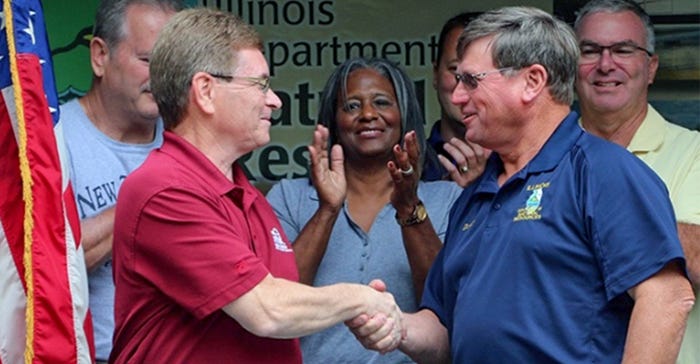
Wayne Rosenthal might be one of the most influential men in Springfield that you’ve never heard of. He’s the director of the Illinois Department of Natural Resources, guiding a staff of nearly 1,100 people, influencing policy and managing 35,000 acres of DNR-owned farmland — and doing it all with the background of a Christian County farm boy.
Rosenthal doesn’t think of himself as an agricultural leader; despite growing up on a farm, he got a degree in math and spent 18 years flying F-4 Phantom jets for the Air Force. He’s spent 25 years coaching local baseball, six years on the local school board, and four years representing District 95/98 (boundary change) in the Illinois House of Representatives. In 2015, the governor asked him to serve as DNR director, and he said yes. Plus, he still manages his family’s farm back in Morrisonville.
In this interview with Prairie Farmer, Rosenthal offers a look at how he has served the public, built consensus and affected changed within the Illinois bureaucracy.
Where did life start for you? I’m from Morrisonville — a lifelong resident. I grew up on a farm, and my mother said, “You’re not going to be a farmer,” so I never went through FFA, maybe a year or two in 4-H. So I went to college, got the opportunity to fly F-4s. I was in the Air [National] Guard for 30 years, and I flew for 18-plus years, and got one more takeoff than landing. Fortunately, I survived by hundredths of seconds.
What brought you back to the farm? I took over my father-in-law’s farm in 1990. The very first guy that I flew with here in Springfield was Jim Kinsella, Mr. No-Till. So he talked to me about that forever, and I started no-tilling. We’re a little over 900 acres now, and we’ve done a lot of conservation work. I’ve got three wetlands that we’ve restored, 13 dry dams that we’ve put in. Matter of fact, one place had 4- and 5-foot gullies when we started, and now we farm right across it. We’ve got it all filled in and farm it the way it should be. We’ll get water, and two hours later it’s all gone. And we’ve got 60 acres of trees we’ve replanted in the bottom.
How did your background prepare you for this job? So there’s people who say, “Hey, what do you know about wildlife?” and I say, so I don’t have a wildlife degree. I got a degree in math because I didn’t like writing papers. There you go. I understand that. I flew airplanes and had the opportunity to manage a lot of people, and then having served four years in the Legislature, I understood the legislative process. All of those things kind of worked together here, and so when I talk to the wildlife outdoor writers and start telling them about the things that we’ve done on the farm and things that we’ve done, trial and error, they say, “Oh, well maybe you do know something about it.”
Why is public service important to you? My dad served on the school board for 20 years and so did my uncle, and they were both military guys. It’s the opportunity to serve, so I served [in the military] for 30 years. When I was flying airplanes, I was responsible for making sure guys were trained and ready to go to war and be combat-ready. Getting back into farming helped me be able to serve the community and give back. I continue to serve on the Lincoln Land Community College board because education is the stepping stone to future success.
 ELECTED: Rosenthal (right) was encouraged into public service. “I was on the Lincoln Land Community College board, which I still serve on. I was on the high school board of education in Morrisonville for six years and then somebody said, ‘Hey, how about you run for office?’ I did and I won.”
ELECTED: Rosenthal (right) was encouraged into public service. “I was on the Lincoln Land Community College board, which I still serve on. I was on the high school board of education in Morrisonville for six years and then somebody said, ‘Hey, how about you run for office?’ I did and I won.”

What is one thing that you do that’s directly tied to your success? The way I treat people. They’ll say, “You talk to everybody, from the lowest level down.” I say, “Yeah, because they’re all important.” A lot of people at my level don’t.
What do you think your appointment at DNR has meant for Illinois farmers? Well, one of the big things is property rights. We had some people that wanted to tile farm ground, and it was going to dump into one of our lakes. Our guys came and said, “No, no they can’t do that.” I said, “You can’t stop them. There are drainage laws that you have to follow.” Our legal folks agreed and said they had to follow drainage law. So in a lot of cases it’s just property rights issues — sometimes the biologist and people within DNR and agriculture don’t necessarily get along.
We’ve all got the same desires and want get to the same end results, but we have to respect each other’s rights and what we want to accomplish. To me, that’s the big thing here. We want to protect the environment, but you want to use the resources that we have available. And so how do the two interact, and what’s the balance? And that’s the important part.
What’s the job as the director like? The way I view the job is that we’re here to serve the people of Illinois and try to figure out what’s best. A lot of the times it’s refereeing: Everybody’s got their inputs and everybody’s got their ideas. In some cases, we agree with them. In some cases, the bureaucracy doesn’t allow the changes. So you have to work through the rules. Sometimes if you don’t like the rules, you go back to the Legislature and change them. It’s like fracking; the Legislature writes the rules, we enforce the rules, and we make sure that the people follow the rules. If they follow the rules, we issue permits. We don’t deny them because we have an opinion.
As someone with a military background and a farm background, you’re used to getting things done. How do you get things done in government? We figure out what needs to get done and just get it done.
I tell our people, don’t worry about what we don’t have. Worry about what you can do with what we do have. We have some very talented people. Prioritize it and take it one step at a time, and just do what you can. One of the most frustrating parts of not having a budget is the contingencies, the what-ifs. Having a budget now helps, but we’re still struggling with what money can we spend and what can’t we spend and what’s the best use of the resources that we have available and what’s the priority?
How does your military experience help with that? I think my actions and the way that I react to things kind of catch people off guard because I don’t overreact. When you’re flying, you don’t worry about the stuff behind you. You worry about what’s in front of you. Pointing fingers and getting upset doesn’t help to get to the solution. When you do something intentionally, that’s not acceptable. But when you make a mistake, let’s fix it and not do it again.
How do you build consensus? When I was in the House, how would I expect people on the other side of the aisle to listen to me if I don’t listen to them? You have to develop a rapport with them so that they trust what you’re telling them and you trust what they’re saying. You have to understand why things are important for each group, and sometimes you can come to common ground on things that you agree with.
What’s the lesson that’s taken you the longest to learn? You can always do more than you think you can.
What do you want farmers to know about DNR? That there’s balance. The wildlife is out there. Balance is important to the wildlife we hunt, and to the pollinators. We need to make sure we maintain balance because we don’t want someone else to come in and dictate how we do our business. Most farmers would rather have less regulation. We’re here to help monitor the environment. We have people here who can help farmers with inputs and give them advice. That’s what we’re here for: balance.
ROSENTHAL REFLECTS
• On having one more takeoff than landing:
“I ejected right in front of the nose of another airplane. That happened in 1986, about the same time ‘Top Gun’ came out. I was Goose, except I survived!”
• On conservation programs at home:
“We put anything that was marginal back into some kind of conservation program. We also have a hunting preserve.”
• On running for office:
“I was on the Lincoln Land Community College board, which I still serve on. I was on the high school board of education in Morrisonville for six years and then somebody said, ‘Hey, how about you run for office?’ I did and I won.”
• On making a change in life:
“I never worried about the future.”
• On hiring:
“The smartest person is not necessarily the one you want to hire; hire the one that’s dependable. We can train people. Dependability is a character trait.”
ROSENTHAL IN BRIEF
Truck? GMC
Tractor? John Deere
Firearm? Remington shotgun
Team? St. Louis Cardinals
Technology? Smartphone
Game? Pheasant or deer
Family? Wife Marcia; sons Dustin, Sean and Casey; three grandkids and one on the way
Best decision? Joining the Air Guard
About the Author(s)
You May Also Like






